Recent Posts
How to Prevent Water Damage
7/12/2024 (Permalink)
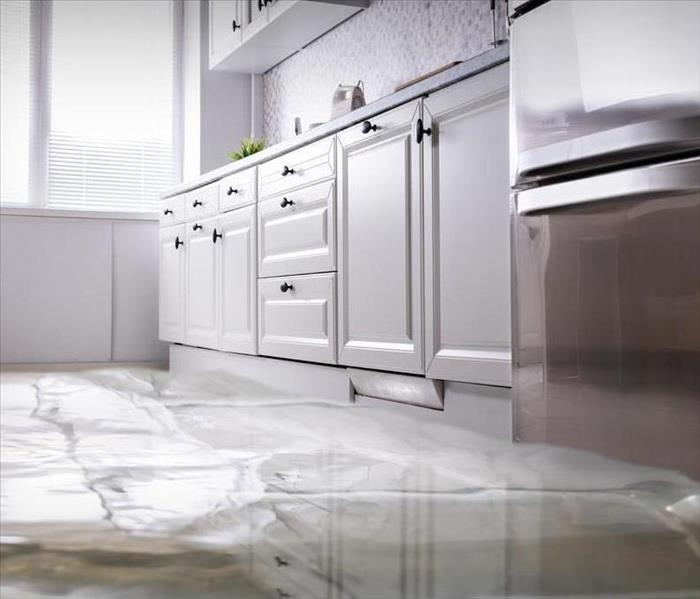 SERVPRO of Cienega Inspections. Call now (323) 400-3400
SERVPRO of Cienega Inspections. Call now (323) 400-3400
Similar to Mold Prevention, being proactive with water damage can save you a lot of money, time, and hassle. Here are some tips for preventing water damage in your home:
1. Before a rainstorm, make sure your roof has no damage, holes, or areas that it can leak from. If there are any areas that can potentially cause a leak, call your roofer ASAP and see if they can fix it. If your roofer can't get out there in time, we can place a temporary tarp up to make sure the chances of water damage decrease drastically.
2. Frequently check your appliance supply lines. If any supply line is old or looks like it has been compromised, ask your plumber to switch out to new supply lines. A lot of water damage happens from appliance supply lines and bathroom supply lines.
3. Check your water pressure frequently. If there is a spike in your water bill, make sure there are no leaks coming out of a pipe.
Mold Prevention
7/12/2024 (Permalink)
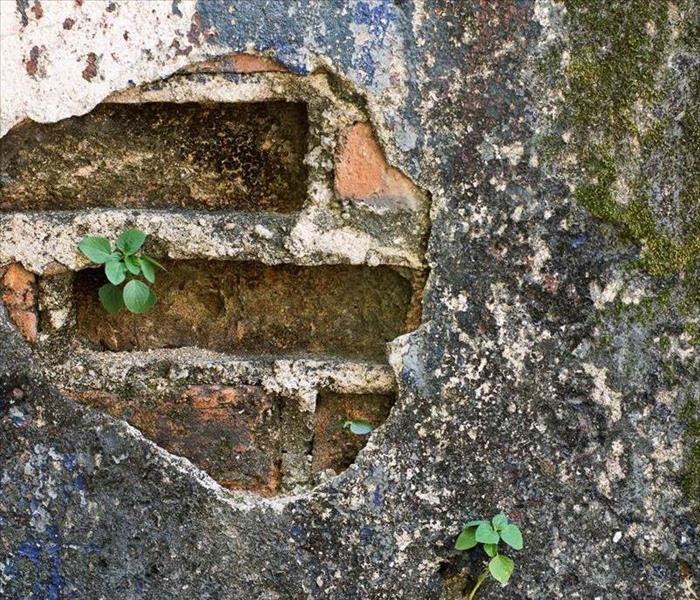 SERVPRO of Cienega Mold Remediation. Call now (323) 400-3400
SERVPRO of Cienega Mold Remediation. Call now (323) 400-3400
In most cases being proactive than reactive saves a lot of time and money. Mold prevention is one of those cases. Here are a few tips to help prevent mold growth in your residential or commercial property:
1. Always have proper ventilation. Bathrooms go through a lot of high levels of humidity and moisture. Always crack a window open during and after a shower. If you don't have a window, make sure your air vent works well and gets cleaned frequently.
2. If water damage happens, be proactive about correctly drying and preventing further damage. Insurance companies usually only cover recent sudden bursts and leaks. Any mold growth found long term and if it's already dry, most insurance companies and policies do not cover the cost of remediation.
3. Keep your home in good shape and inspect frequently for any leaks or roof damage.
Commercial Water Damage
7/12/2024 (Permalink)
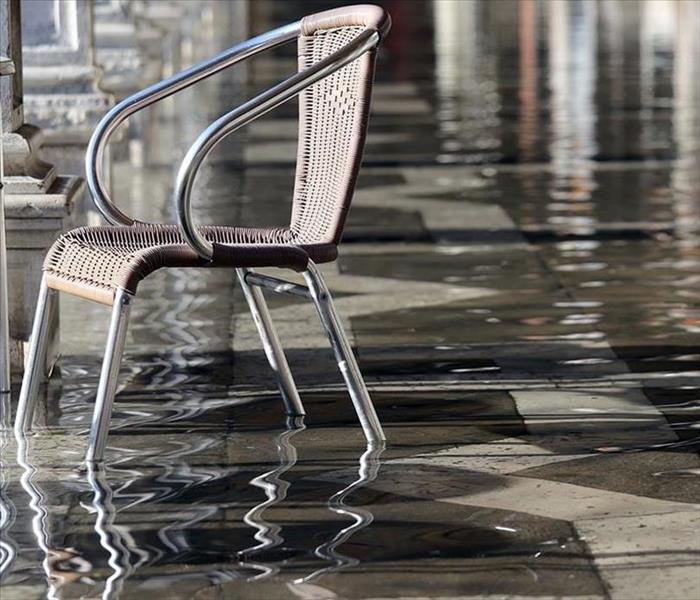 SERVPRO of Cienega Mitigation. Call now (323) 400-3400
SERVPRO of Cienega Mitigation. Call now (323) 400-3400
If water damage is not stopped soon enough, it can do a lot of damage to a commercial property. The first and most important step is to hire a restoration company that you trust. We will dispatch a team to extract any standing water right away. Once we have extracted, we will place equipment to start the drying process. If there is heavy damage to the contents and property, usually both the tenant and owner can file a claim through their insurance. We can oversee and handle all aspects of the job for both the tenants and owners. If needed, we can move out all of the tenant's personal property off the job site until the restoration is done. If any demolition is needed, we can go ahead and perform the reconstruction. Once we are done with the job, the building will look in even better shape than it did before.
Why To Hire SERVPRO of Cienega
7/12/2024 (Permalink)
 SERVPRO of Cienega Restoration. Call now (323) 400-3400
SERVPRO of Cienega Restoration. Call now (323) 400-3400
Shopping for the right restoration company can be stressful. Depending on the company you pick, the entire job scope can be greatly affected. Here are a few tips to take into account when hiring a restoration company.
1. Certifications/Licenses
- Make sure the company has all their certifications and licenses to be able to correctly handle your job.
2. Variety of skill sets
- Check that the company can handle all aspects of remediation/restoration. If the company isn't equipped or trained to handle different parts of the job, that would be the first red flag.
3. Communication is key
- Is the company always ready to answer all of your questions? Make sure they are ready and there for you 24/7 to answer any questions or concerns you may have.
4. Ethical/knowledgeable
- Does the company seem to have good ethical practices and knowledge behind the science of restoration.
Keep Our Oceans Clean
7/12/2024 (Permalink)
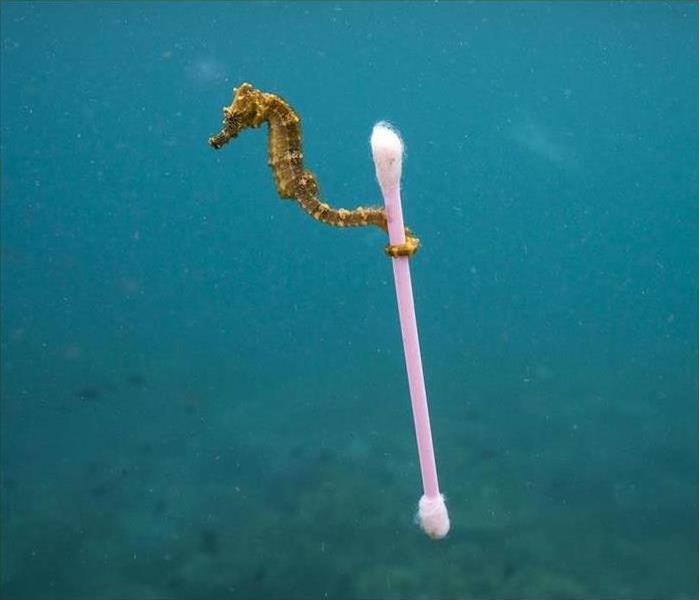 SERVPRO of Cienega. Call now at (323) 400-3400.
SERVPRO of Cienega. Call now at (323) 400-3400.
Do your part and keep our earth clean. It is important for everyone to clean our environment. Even if you do not litter in a storm drain or drainage ditch your trash can eventually end up in the ocean after a storm.
Here are a few good tips to keep our oceans clean:
1. Only throw your trash away in a trash bin. (Remember to recycle!)
2. Secure your trash bins before a storm. If possible, put your bins into a covered area.
3. Properly dispose of any trash that you may find on the streets.
4. Get involved in an ocean cleaning organization. Get your family and friends involved and plan and get involved with an organization that sounds appealing to you.
Change does not come easy. However, little by little we can decrease the amount of marine pollution and start cleaning the 5.25 trillion pieces and counting.
Pack Out Services
7/12/2024 (Permalink)
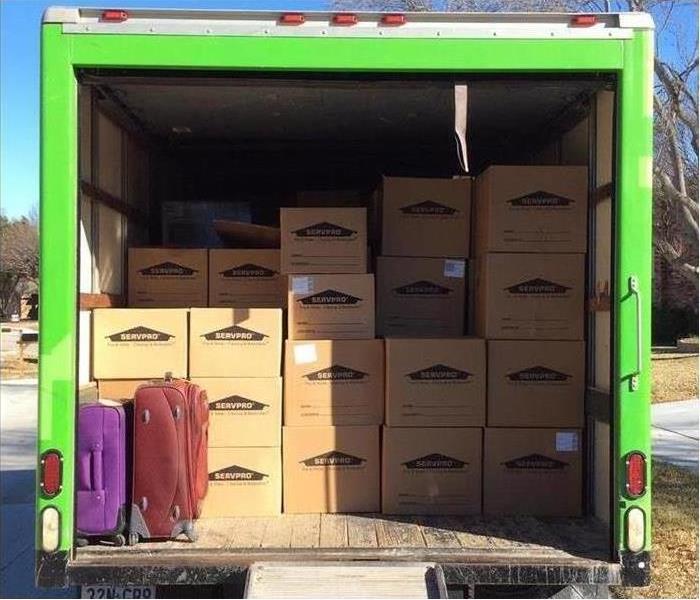 SERVPRO of Cienega Pack Out Services. Call now at (323) 400-3400
SERVPRO of Cienega Pack Out Services. Call now at (323) 400-3400
Dealing with a home disaster can be quite devastating. It becomes more overwhelming when you lose your personal belongings due to the damages of a fire or water loss. In an event of a water or fire loss, contents may be affected. With this, our content specialists will professionally inspect all contents that might have been affected. At times, some of the items may be identified to be “non-salvageable” or “total loss” which means that those items cannot be cleaned or restored. For proper water mitigation, mold remediation, or fire restoration, these unaffected belongings need to be moved out of the home. SERVPRO of Cienega wants to ensure that your home and personal belongings are in good hands. We don’t only offer restoration services, we also help with any pack-outs that are needed in such events. Our trained pack-out technicians will take appropriate measures to minimize loss or damage of contents by carefully inventorying, packing, transporting, cleaning, storing, and delivering your belongings. With any emergency situation, SERVPRO of Cienega will be ready 24/7, 365.
The Science of Water Damage
7/12/2024 (Permalink)
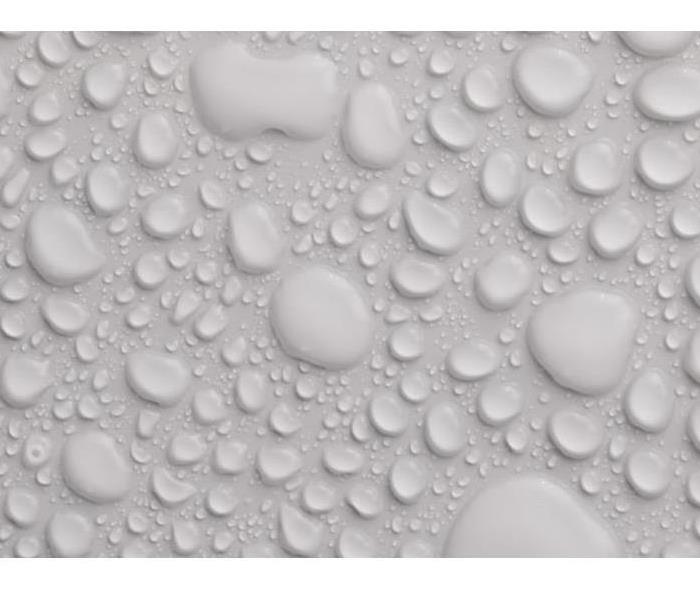 SERVPRO of Cienega Inspections. Call now (323) 400-3400
SERVPRO of Cienega Inspections. Call now (323) 400-3400
Most of the materials in a home or commercial building are hygroscopic. This means that these materials draw moisture from the surrounding environment. All hygroscopic materials will reach equilibrium with the environment around them. With sudden water damage, drywall can soak up moisture and be wet. The typical moisture levels of drywall are low. With the sudden water damage, the drywall soaks up and holds onto the moisture. However, over a period of time, the material will eventually reach equilibrium and release any excess moisture. The opposite is also true. If a piece of drywall is in a climate with very heavy humidity, the piece of drywall will match the environment around it and won't ever dry up. Luckily for us, we do not live in areas with extreme humidity like tropical rainforests. This allows us to use our drying equipment to expedite the process of materials drying out to avoid any secondary damage.
Water Category Changes
7/12/2024 (Permalink)
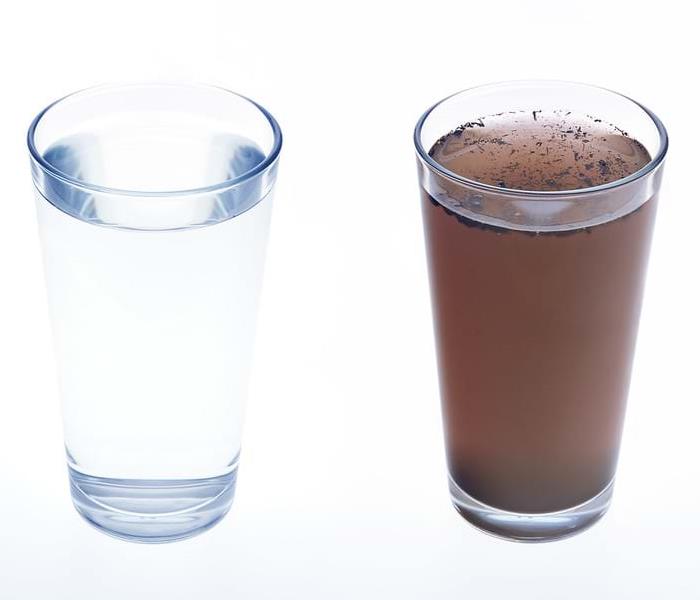 SERVPRO of Cienega Mold Remediation. Call now (323) 400-3400
SERVPRO of Cienega Mold Remediation. Call now (323) 400-3400
Our first step in an inspection is to determine what category the water is. The category of water at a job site is important information to properly mitigate any damage. There are 3 categories for any water damage.
Category 1 - Includes a sanitary water source that does not pose a substantial risk. Depending on the length of time and temperature, category 1 can deteriorate to category 2 or category 3. Supply lines, rainwater, and toilet tanks are some common examples of category 1.
Category 2 - Contains significant contamination and has the potential to cause discomfort or sickness. category 2 also can turn into category 3 depending on the temperature and how long it has been left untreated.
Category 3 - Grossly contaminated and can contain pathogenic toxigenic, or other harmful agents and can cause significant adverse reactions to humans if contacted or consumed. Any porous material is subject to needing to be disposed of.
What to Do During a Fire
7/12/2024 (Permalink)
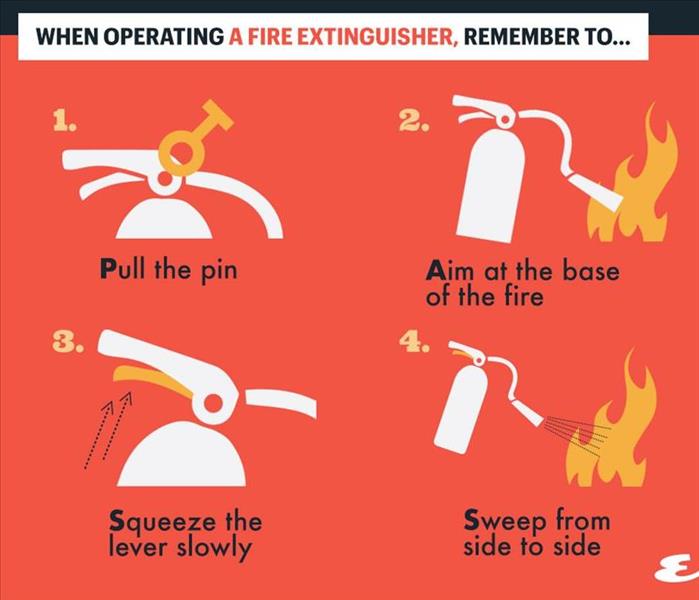 SERVPRO of Cienega Fire Restoration. Call now at (323) 400-3400.
SERVPRO of Cienega Fire Restoration. Call now at (323) 400-3400.
Here are some tips from Redcross.org on what to do during a fire:
- Know how to use a fire extinguisher.
- Remember to GET OUT, STAY OUT, and CALL 9-1-1 or your local emergency phone number.
- Yell "Fire!" several times and go outside right away. If you live in a building with elevators, use the stairs. Leave all your things where they are and save yourself.
- If closed doors or handles are warm or smoke blocks your primary escape route, use your second way out. Never open doors that are warm to the touch.
- If you must escape through smoke, get low and go under the smoke to your exit. Close doors behind you.
- If smoke, heat, or flames block your exit routes, stay in the room with doors closed. Place a wet towel under the door and call the fire department or 9-1-1. Open a window and wave a brightly colored cloth or flashlight to signal for help.
- Once you are outside, go to your meeting place and then send one person to call the fire department. If you cannot get to your meeting place, follow your family emergency communication plan.
Fascinating Fire Facts
7/12/2024 (Permalink)
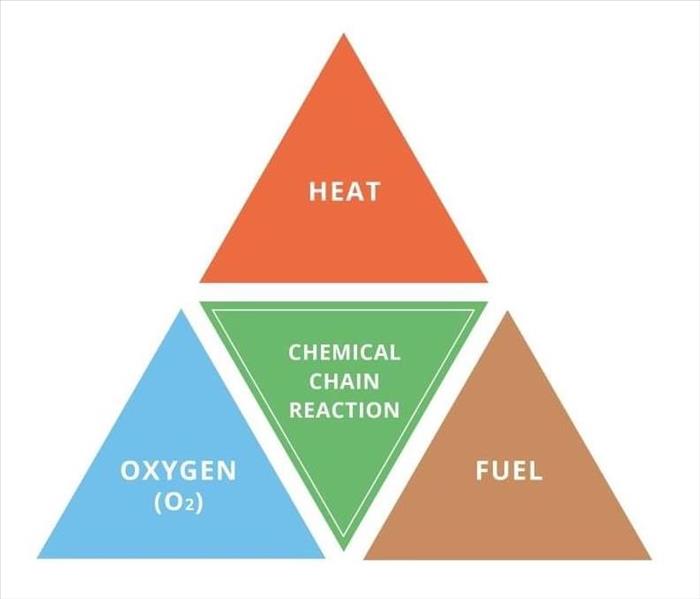 SERVPRO of Cienega Fire Restoration. Call now at (323) 400-3400.
SERVPRO of Cienega Fire Restoration. Call now at (323) 400-3400.
Fire can be scary and devastating. However, it is essential and can be fascinating when in a controlled environment. Here are some fascinating fire facts:
- For as far as we know, fire can only burn on earth. Other planets do not have enough oxygen to allow a fire to keep burning.
- During wildfires, trees explode.
- You can start a fire with ice.
- Fires are caused by humans 85% of the time.
- There were 1,291,500 fires in 2019. This resulted in 14.8 billion dollars worth of loss.
- The 2018 Woolsey fire burned 97,00 acres. Woolsey totaled an estimated $4.2 billion.
- Good burn: The 1666 Great Fire of London destroyed 80 percent of the city but also ended an outbreak of bubonic plague that had killed more than 65,000 people the previous year. The fire fried the rats and fleas that carried Yersinia pestis, the plague-causing bacterium.




 24/7 Emergency Service
24/7 Emergency Service









